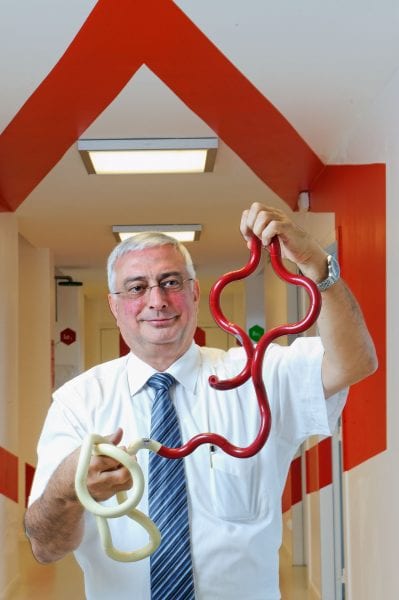 New Advanced Materials board member, Prof. Georges Hadziioannou—leading expert in the field of organic electronics, semiconducting polymers and nanostructured polymeric materials—took the time to answer a few questions about his scientific career, and research and academic publishing in general.
New Advanced Materials board member, Prof. Georges Hadziioannou—leading expert in the field of organic electronics, semiconducting polymers and nanostructured polymeric materials—took the time to answer a few questions about his scientific career, and research and academic publishing in general.
Can you briefly state how your own research focus has evolved over the course of your academic career?
After studying polymer chemistry, physical chemistry and physics, I moved to the science of surfaces and interfaces and then to advanced polymer functional materials for high technologies (information storage and nanotechnologies). Then when I moved from industry to academia, I started working in the new emerging field of polymer organic electronics.
What inspired you to pursue these particular research topics?
My tenure at the corporate research labs of IBM at Almaden Research Center, a highly stimulating environment, gave me the taste for pursuing high standards in academic and industrial research. Additionally, it has been a great source of inspiration for my research topics up to the present time of my career.
Which direction will your research take in the future?
In brief I will continue the research on new advanced functional polymer materials (synthesis, formulation and processing) for the emerging technology of flexible and printable organic electronics.
What have been the highlights of your academic career?
Besides the achievements regarding research, teaching (a unique text book on “Polymer Electronics”) and technology transfer (creation of two start-ups), another accomplishment was the supervising of around 100 graduates and undergraduates (50 PhDs (44 graduated and 6 on going) as well as at least 50 undergraduates (Masters)) who today are prospering in academia, industry, government and other institutions (e.g. European Patent Office). Moreover, during my career I have been the instigator of i) the Center of Excellence of the Materials Science Center at the University of Groningen (NL) now the Advanced Materials Zernike Science Center, ii) the “Laboratoire d’Ingéniérie des Polymères pour les Hautes Technologies” (LiPHT) in the University of Strasbourg, iii) the comprehensive platform for the flexible and printed organic electronics, the EquipEx ELORPrintTec at the University of Bordeaux as well as the Industrial Chair in “Advanced functional materials for new technologies of information, communication and energy”, co-sponsored by Aquitaine Region, ARKEMA and UB/CNRS initially and now by the ANR (the National French Research Funding Agency) and ARKEMA.
Within the broad scope of materials and polymer science, what do you consider to be the most pressing issues and challenges of the next 10 years?
a) The synthesis of old and new polymers based on sustainable organic and / or enzymatic catalysis from renewable resources.
b) In the particular field of organic electronics: i ) The scale up methodologies for the production of electronic grade materials as well as their formulations and processes engineering and ii) A deeper understanding of their electronic properties as well as their relationship to the structure.
How do you see the future of scientific publishing with respect to the Open Access movement?
The scientific community is already strongly moving towards open access publishing. As such, it is vital for established publishers/journals to take a proactive stance and adapt to this new paradigm. Of course, this will include developing new and fair financing schemes and can only be done if rigorous peer review quality is preserved. and do you think this will this change the that way science is communicated? Scientific communication will continue to evolve, as technological advances and new platforms of communications will change the format in which information is presented.
What advice would you give to students or early-career researchers wishing to follow a similar academic path to yours?
Work hard and smart to learn the basics of your field, and then try to bring solutions to pragmatic problems by performing excellent research. For that you need to work at the interface of disciplines (e.g. Chemistry and Physics). For your career don’t hesitate to take risks, such as creating a start up.
Apart from research, what other interests do you have?
Research and training young fellows with it is in itself is a lot of fun with the exception of the administrative burdens and red tape that are associated nowadays. Moreover two other items that attract my interest are: a) My great interest is Oenology. b) I’ve always been interested in cars, and especially in the evolution of the technology in improving their comfort and performance.

















